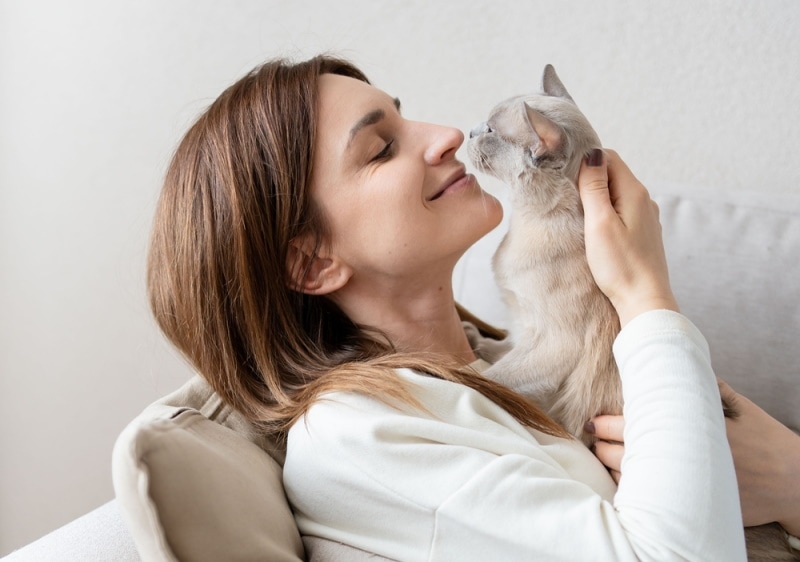Do Cats Like When You Sing to Them? What Science Says
Updated on

Click to Skip Ahead
Any cat owner will tell you that the relationship you have with a feline is different than a dog’s. Perhaps it’s because we may talk to our pets more than canines. Research has shown that our cats can become as attached to us as we are to them 1. We also relate music and singing with many emotions and express our feelings this way, but do felines appreciate it as we do?
There undoubtedly is an individual component to this question based on the associations a cat has formed with music. That can determine whether a cat likes it when you sing to them. Some pets will cherish the attention. However, there’s also a musical side to the question that makes the answer less clear for all felines. Let’s get into the details.
Feline Vocalization
Scientists have documented 21 different vocalizations in domestic cats 2. Of course, some pet owners have a larger repertoire with their animal companions. We know that cats are intelligent. Research has shown they can not only learn their names but also pick out their owners’ voices without visual clues 3. Felines even find their caregivers’ presence comforting in stressful times. It makes sense that sharing positive emotions with singing would have a similar calming effect. The question remains whether cats perceive it that way.

Emotional Recognition in Cats
You don’t need to tell a cat owner that their pets can read their body language. Perhaps we exaggerate our emotions around them like we would in front of young children. However, felines are masters at comprehending situations by using all their senses. They can also adjust their actions and behavior accordingly.
It stands to reason that cats can understand the happiness we may feel when we sing. We may use those same exuberant emotions to express our feelings. That could make it easier for our pets to understand the situation and, presumably, how to react. Nevertheless, we all have our specific tastes in music. If we say cats are intelligent, can we also assume they may have their preferences for what we sing or play?
Musical Preferences in Cats
An interesting but small study examined the differences in cats’ preference for various genres of music. The researchers observed no difference in their responses to human music. They also tested their reactions to so-called “cat music,” which was more in line with their auditory range and feline rhythms. Cats have a hearing range of about 48 Hz to 85 kHz; it’s between 20 Hz and 20,000 Hz for humans.
The normal range for felines is about an octave higher than humans. Many of our songs also resonate with us because they follow the rhythm of our heartbeat. It isn’t the same with cats. Instead, the researchers used crafted tunes that resemble their vocalizations. This “cat music” triggered the most dramatic responses. What are some possible applications for these findings?
We often turn to music for relief from stress. Research has shown its positive effects on our physical and mental well-being. Scientists hypothesized it may have similar benefits with cats. One study considered the effects of no music, classical music, and cat music on feline patients at a veterinary clinic. Classical and cat music therapy were beneficial, although neither lowered cortisol levels significantly.
The takeaway message is that cats have musical preferences, but they seem more responsive when they are tunes that match their vocalizations. Therefore, your pet may or may not like you singing to them. Perhaps the best way to determine their judgment of your musical ability lies in their reactions to it.

Reading Your Cat’s Body Language
You can tell a lot about cats just by looking at them. Vocalizations are a vital clue, as are their body position, tail movement, and eyes. A feline in a relaxed state may lie on their side, exposing their belly with their tail loosely wrapped around them. A happy cat’s ears are erect and not flattened against their head. Their eyes might be wide open or half closed. They may even be purring.
If your pet holds themself this way, the chances are your cat isn’t offended by your singing and may even be enjoying it. We suggest keeping your voice low and soothing. And if your kitty walks away, don’t take it personally.
Final Thoughts
Music is a universal language that crosses many cultural lines. Our feline companions may not always share the same taste in music, but your pet may enjoy the extra attention that singing brings to your relationship. Of course, a treat can make any time spent with you more pleasurable and help create a positive association if you like to sing.
Featured Photo Credit: Julija Sulkovska, Shutterstock












